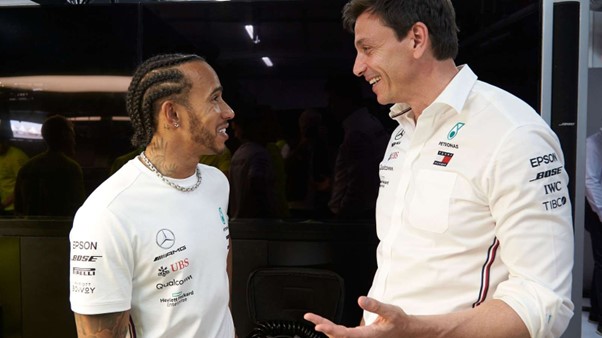Many of you will know I am a keen fan of F1 and, of Lewis Hamilton in particular. At this point someone of you may wish to challenge me on my choice of driver (and even race team), which is great as I am always open to discussing the pros and cons of individual drivers, so let’s pick it up next time we meet up 😊. However, this article is not about Lewis or any other driver but Toto Wolff, the team principle for Mercedes.

Apologies if F1 is not your sport; the good news I don’t plan to focus on the technical side of motor-racing. I wanted to talk about leadership and management style with reference to Toto Wolff. Over the years I have watched Toto on TV, interacting with drivers, engineers, other F1 teams and the press, and I have always been incredibly impressed by his style. He comes across as passionate and committed, straightforward and direct, honest and pragmatic…the list could go on. I wondered whether what I was seeing was backed up by his behaviour behind the camera.
Some background on Toto (apologies to those who already know this and probably much more); he joined Mercedes in 2013. Under his leadership the Silver Arrows (the nickname for the Mercedes team) have developed in to one of the most successful racing teams in the history of F1, winning a record seven consecutive championships in both the drivers’ and constructors’ categories. With Niki Lauda’s help, he influenced Lewis Hamilton to leave his boyhood team, McLaren and join Mercedes. The results are there…how has he contributed to the team’s success?
Working through articles that have been written about him, there is a consistent theme. Toto is passionate about what he does. He has a drive and an intensity which many of us can only dream of. This started to develop in his childhood as he watched his father’s 10 year struggle with brain cancer, which resulted in his death when Toto was a teenager. He has said the trauma was a very strong driver for him. He went on to win the 24 hours of the Nürburgring in 1994 and then set up his own investment firm in 1998, at the age of 26. He has said “you have to bring passion into your life. If you only go to your office without loving what you do, it is difficult to be successful”.
Fast forward to 2009 and Toto joined the Williams F1 team and then following his success with Williams he was invited to join Mercedes in 2013. When asked about his role in the team he says “I run people that run cars…It’s an understanding of the organisation and having a real interest in the people and understanding racing and understanding finance…It’s a bit of all of that but the most important is the interest in the people”.
Toto tells a story of how on his first day in charge, he gave a team-wide presentation on the team’s future ambitions. After the presentation ended and the team started to leave, a mechanic came up to him and simply said “nice slides”. The team had gone through numerous owners and many changes in management, leadership and championship performance, so trust was low. Toto knew he had to build trust. He worked on building a team of openness, with a “no blame” culture and no internal politics. It was to be an environment where people were encouraged to speak up following Ceri Evans’* “See it, say it, fix it”.
He is also a strong advocate of relinquishing control “Most important is to acknowledge that we are all different individuals and we need different frameworks in order to perform well…sometimes the most creative people, the ones that are able to outperform others and perform on a different altitude, are the ones that live a different life. And you just need to be able to embrace that”.
In meetings, he often starts by admitting his own mistakes to sensitise the entire team to be able to address problems openly. His focus is always on the problem, never on the individuals “We learn most of what we learn on our hardest days. If you are able to analyse a problem without looking for blame in one person, but in the problem itself, your organisation can even emerge strengthened from a painful experience”.
Toto believes one of the biggest contributions to the success of the Mercedes F1 team is setting clear values which govern team culture. He also goes on to say “if it were easy then it wouldn’t be a differentiator”.
A people-centric culture built on trust is not a one-off project for an F1 boss, it’s something we can all continually work on, even if your culture is great. Sometimes discussing your business with a third party can help identify what needs work. The team at Emphasis make an excellent sounding board, contact us for a chat.

*New Zealand rugby team sport psychologist
By Jane Michel

